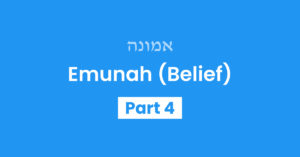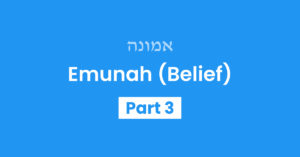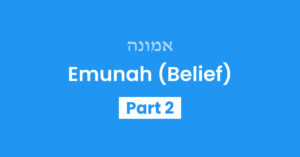Rosh Chodesh Nissan will be this Tuesday, which means that Pesach is coming soon!
On Pesach, we tell over the story of Yetzias Mitzrayim – how Hashem took our ancestors out of Egypt over 2,000 years ago. But it’s not just once a year that we remember leaving Egypt; we are required to remember Yetzias Mitzrayim every day of our lives.1
We mention Yetzias Mitzrayim at many points in davening, such as in “Az Yashir” and in the last passuk in Shema. There are also many mitzvos that are meant to remind us of Yetzias Mitzrayim: Sukkos reminds us of how Hashem protected us in the desert after we left Egypt2, and Pidyon HaBen reminds us that Hashem did not kill the Jewish firstborn during the plagues in Egypt.3
Why did Hashem give us so many mitzvos to remind us about Yetzias Mitzrayim? It happened over 2,000 years ago! Wouldn’t it be enough if we just remembered it once a year on Pesach?
The Foundation of Our Emunah
The Ramban explains4: Remembering Yetzias Mitzrayim is so important because Yetzias Mitzrayim is the foundation of our entire Emunah. It proved to us that we can believe in Hashem and trust in His power.
Yetzias Mitzrayim is the foundation of our entire Emunah.
People tend to think that nature is fixed, constant, and reliable. When I wake up in the morning, the sun will be in the sky. When I turn on the faucet, water will come out. But when Hashem punished Egypt with the 10 Plagues, He changed the rules of nature. Water suddenly turned into blood, and light turned into darkness. Frogs, lice, and locust swarmed the earth. Wild animals came out of their natural habitats and started attacking humans. Fire and water joined together to form a miraculous hail – even though water is supposed to extinguish fire, according to the rules of nature.5
By changing the rules of nature during the 10 plagues, Hashem proved to the entire world that He controls nature, and He can do whatever He wants.6 Believing in this concept – that Hashem can do anything – is the foundation of our entire Emunah.
Hashem proved to the entire world that He controls nature, and He can do whatever He wants.
Emunah: The Purpose of Our Existence
Why was it so important for Hashem to prove His unlimited power? Who cares if some people in the world don’t realize the truth of Hashem’s power?
The Ramban explains that Hashem cares very much to prove His power because the entire purpose for why Hashem created this world is so that we should learn to have Emunah – to believe in His unlimited power and know that nothing can stop Him.
The entire purpose for why Hashem created this world is so that we should learn to have Emunah – to believe in His unlimited power and know that nothing can stop Him.
As the Ramban writes7: “The purpose of all mitzvos is that we should believe in Hashem and acknowledge that He is our Creator. This is the purpose of Creation. There is no other reason why Hashem created the world and nothing else that Hashem wants from us other than to know that He is our Creator.”
The Ramban continues: “When Hashem changed the rules of nature [by doing miracles in Egypt], it made clear to everyone that there is one G-d who created this world, and knows what goes on down here, and is involved, and is capable [to do as He wishes]…. But since Hashem does not want to do miracles in every generation, He commanded us to make constant reminders for ourselves to remember what we saw [in Egypt], and to teach it to our children so they can teach it to their own children…. “
We can now understand why Hashem gave us so many mitzvos to remember Yetzias Mitzrayim. It is because the miracles of Yetzias Mitzrayim taught us to believe that Hashem can do anything, and having this Emunah is the purpose of our entire existence.
The Need for Constant Reinforcement
It’s not enough to just realize once that Hashem controls nature, and then move on with our lives and never think about it again. If we don’t make an effort to remind ourselves of this truth every day, we risk falling into the trap of the illusion of nature. We might start to believe that nature operates on its own, and we will forget that Hashem has the power to change nature whenever He wants.
It looks like the trees grown on their own, the sun rises every day on its own, and the rain falls on its own. But the truth is that nothing can move, grow, think, breathe, or even exist without Hashem consciously willing it to do so.
This week, let’s practice looking at some things we experience in this world, and remembering Hashem controls nature, and that He can change the rules of nature if He ever wishes to do so. By remembering this truth, we will be deepening our Emunah and fulfilling the entire purpose of our Creation.
Sources: [1] Devarim 16:3; [2] Vayikra 23:43; [3] Shemos 13; [4] Ramban on Shemos 13:16; [5] Rashi on Shemos 9:24; [6] See Ibn Ezra on Shemos 9:1; [7] Ramban, ibid.
Your Challenge
Once a day, notice something “natural” that you are experiencing in this world, and say out loud (or whisper to yourself) how Hashem can change it, if He would want to.
FOR EXAMPLE:
- Even though I have a headache right now, Hashem can take it away if He wants.
- Even though I am having a bad hair day, Hashem can make it look better if He wants.
- Even though I am having a hard time finding a job, Hashem can help me find one easily as soon as He wants me to have it.
- Even though the weather forecast says it will rain tomorrow when I have my party planned, I know Hashem can change the weather if He wants.
Torah Questions
- According to many opinions, the first of the 10 Commandments is the foundation of our entire Emunah. How does Hashem identify Himself in this commandment? “I am Hashem, your G-d, who ______”? (See Shemos 20:2)
- When the Jewish people were slaves in Egypt, Hashem told Moshe to go tell them that they would soon be freed. But Moshe was afraid they would not believe him. Which 3 miraculous signs did Hashem tell Moshe to do, in order to help the Jewish people believe in his promise? (See Shemos Perek 4)
- In Shemos 14:31, it says that Bnei Yisroel believed in ______ and ______?
- In Devarim 9:23, Moshe rebuked Bnei Yisroel for not believing in Hashem, when Hashem had told them to _____?
- According to the Gemara (Taanis 8a), what falls in the merit of people who have Emunah?
- According to the Gemara (Brachos 24b), who is considered a person with “little emunah”?
Questions to Ponder
- The Gemara says that the prophet Chabakuk summarized all 613 mitzvos into one sentence: “A tzaddik lives with Emunah.” What do you think this means? How does this one sentence summarize all 613 mitzvos?
- A passuk in Tehillim says: “To tell of Your [Hashem’s] kindness in the morning, and Your Emunah during the nights.” Why do you think kindness is associated with the morning, and Emunah is associated with the night? Why not say the opposite?
- The Midrash Tanchuma writes that in the future, we will merit to be redeemed from Galus (exile) only in the merit of our Emunah. Why do you think our Emunah is so powerful that only this merit can bring our Ultimate Redemption? What about all of the rest of the mitzvos that we’re doing – don’t those bring the Geulah closer, also?
- The Midrash writes that Hashem created the world with the middah of Emunah, and He continues to interact with the world with the middah of Emunah. What do you think this means? How is it possible for Hashem to have the middah of Emunah – isn’t belief something that WE have towards HIM?




